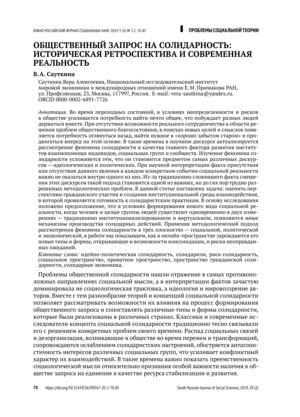Abstract
It is assumed that in the present-day individualized and culturally diverse society there is an urgent need for a new form of solidarity to bring people together. During transitional periods the need for people to stick together is increasing. Losing the opportunity for real cooperation in solving problems in the sphere of social well-being and in searching for new goals and purports, makes people look back, discover new senses in the long-forgotten past, and move ahead. At such times, the phenomenon of solidarity is becoming the major factor in the development of mutual aid institutions for individuals, social groups and communities, which is well traced in scientific discourse. The research of the solidarity phenomenon is becoming all the more complicated because it is discussed across the most diverse types of discourse, including ideological and political ones. While interpreting the phenomenon of solidarity in every concrete event of social reality, whether it is registered or not, it is important not to be involved into only one or the other. Since it is a well-established fact that ideological and political discourses are often confused, this approach seems an important methodological problem, most difficult to solve. The article is aimed at assessing the prospects of civic participation and at creating an institutional environment of interaction in which readiness for solidarity practices is manifested. The research is based on the assumption that at the time when a new social reality is being created and when individuals and groups of people simultaneously exist in two dimensions (traditionally institutionalized and virtual), there appear some new ways of causing joint actions. With the help of the methodological approach whose aim is to examine the phenomenon of solidarity from three angles (social, political and economic) the research demonstrates the birth of new types and forms of solidarity that open up new vistas for consolidation, as well as risks of undue risks.
Keywords
References
Бурдье, П. (2005). Социология социального пространства. СПб.: Алетейя; М.: Институт экспериментальной социологии: Алетейя.
Буржуа Л. (1899). Солидарность. М.: А.А. Никитин.
Волков, Ю.Г. (2017). Приватное пространство: опыт социологической рефлексии солидарстского потенциала новой социальной реальности. Социологические исследования, 12, 20–29. DOI: 10.7868/S0132162517120030
Гофман, А. (2001). Эмиль Дюркгейм в России: Рецепция дюркгеймовской социологии в российской социальной мысли. М.: ГУ ВШЭ.
Гофман, А. (2013). Солидарность или правила, Дюргейм или Хайек? О двух формах социальной интеграции. Социологический ежегодник, 1, 97–167. Режим доступа https://rucont.ru/efd/476559
Добреньков, В. (ред.). (1996). Западно-европейская социология XIX века. О. Конт, Д.С. Милль, Г. Спенсер: Тексты. М: Международный университет бизнеса и управления.
Дюркгейм, Э. (1991). О разделении общественного труда. Метод социологии. М.: Наука.
Егоров, В.Г., Штоль, М.В., Иншаков, А.А. (2018). Сельскохозяйственная кооперация: вопросы теории, региональный аспект. Региональная экономика и управление: электронный научный журнал, 3 (55). Режим доступа https://eee-region.ru/article/5501/.
Лапкин, В.В., Семененко, И.С. (2013). «Человек политический» перед вызовами «infomodernity». Полис. Политические исследования, 6, 64–81.
Луман, Н. (1996). Общество, интеракция, социальная солидарность. Человек, 3, 100–107.
Луман, Н. (2005). Реальность массмедиа. М.: Праксис.
Луман, Н. (2005). Эволюция. М.: “Логос”.
Малькова, В.К., Тишкова, В.К. (ред.) (2016). Антропология медиа: теория и практика. М.: ИЭА РАН.
Маркс, К. (1960) Гражданская война во Франции. В К. Маркс и Ф. Энгельс. Сочинения. Изд. 2. М: Государственное издательство политической литературы (с. 347–348). Москва: Политиздат.
Мартынова, Е. Директор Сhange.org Дмитрий Савелов: «Каждый день выигрывает одна петиция». Новые известия. Режим доступа https://newizv.ru/news/society/14–10–2016/247944-direktor-shangeorg-dmitrij-savelov-kazhdyj-den-vyigryvaet-odna-peticija
Мирошниченко, И.В. Морозова, Е.В. (2017). Сетевая публичная политика: контуры предметного поля. Политические исследования, 2, 82–102. Режим доступа https://dlib.eastview.com/browse/doc/48608489
Морозова, Е.В. (2014). Гибридные субъекты публичной политики: антиистеблишментские партии. Вестник ВГУ Серия: История. Политология. Социология, 4, 90–93.
Пушкарев, Б. (2003). Российский солидаризм: вчера и сегодня. Посев, 4, 11–18.
Рябченко, Н.А., Катермина, В.В., Гнедаш, А.А., Малышева, О.П. (2018). Политический контент социальных движений в online-пространстве современных государств: методология анализа и исследовательская практика. Южно-российский журнал социальных наук, 19 (3), 139–162.
Садовая, Е.С. (2018) Человек в цифровом обществе: динамика социально-трудовых отношений. Южно-российский журнал социальных наук, 19 (3), 6–20.
Садовая, Е.С., Сауткина, В.А. (2015). Трансформация принципов современного мироустройства: социальный аспект. М.: ИМЭМО РАН.
Сауткина, В.А. (2017). Возрождение солидарной экономики: попытка реализации утопии или реальная мотивация к развитию? Мировая экономика и Международные отношения, 61 (1), 63–71.
Усачева, О.А. (2012). Гражданское общество и правовое государство. Общественные науки и современность, 6, 35–42.
Яницкий, О.Н. (2010). Модернизация и реабилитация после пожаров и наводнений. Вестник Института социологии, 1, 364–377.
Яницкий, О.Н. (2011). Риск солидарности в критической ситуации. Социологический ежегодник, 1, 143–161.
Battin, J.M. (2005). The Essence That Is Belonging Together: Identity, Embodiment, and Skillful Coping During the 2015 Greek Referendum. Retrieved from http://journals.sagepub.com/doi/pdf/10.1177/2158244017717300
Beck, U. (1992). Risk Society. Toward a New Modernity. L.: SAGE.
Couldry, N. (2012). Media, Society, World: Social Theory and Digital Media Practice. Malden, MA: Polity. Press. Retrieved from: file://C:/Users/User/Downloads/3472–13971–1-PB%20(1).pdf
Irwin, A. (2001). Sociology and Environment. A Critical Introduction to Society, Nature and Knowledge. Malden, MA: Polity. Retrieved from https://trove.nla.gov.au/work/16029354?q&versionId=46553503
Latzer, M., Büchi, M., Festic, N., Just, N. (2001). Internet und Politik in der Schweiz 2017. Retrieved from https://www.researchgate.net/publication/321288050_
Sorokin, P. (1947). The Roles of Similarity and Dissimilarity in Social Solidarity and Antagonism. In Sorokin P.A. Society, Culture and Personality: Their Structure and Dynamics. A System of General Sociology (pp. 132–144). N.Y.; L.: Harper a. bros.
Schroeder, R. (2017). Towards a Theory of Digital Media. Information, Communication & Society, 21 (2), 1–17. DOI: 10.1080/1369118X.2017.1289231


